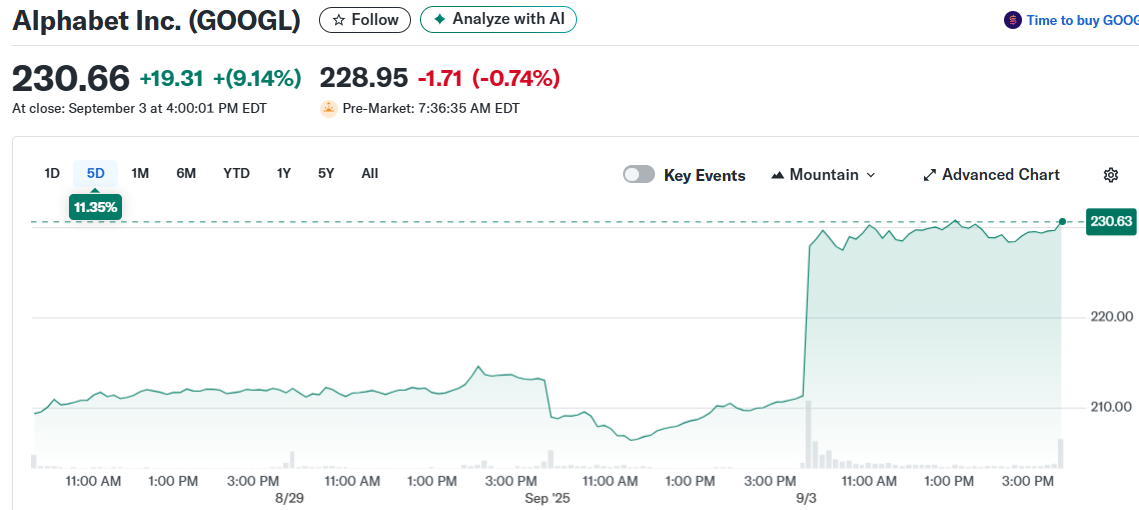TLDR
- Google’s Universal Ledger blockchain project is driving stock momentum, with shares jumping over 9% as the company enters the blockchain finance space
- Federal judge ruled Google won’t be forced to sell Chrome browser, avoiding harsh antitrust penalties and providing legal relief for investors
- Google’s blockchain strategy targets rivals Stripe and Circle with neutral infrastructure approach, partnering with CME Group for institutional adoption
- Court cited AI competition from ChatGPT and other chatbots as reason to avoid breaking up Google’s search monopoly
- Apple also benefits from ruling as Google can maintain its default search engine deal on Safari browsers
Alphabet shares surged more than 9% as investors celebrated a major legal victory and the company’s expanding blockchain ambitions. The tech giant avoided potentially devastating antitrust remedies while simultaneously advancing its Universal Ledger project.

A federal judge delivered welcome news for Google shareholders. The company will not be forced to sell its Chrome browser, dodging the harshest potential penalties in a landmark antitrust case. Judge Amit Mehta’s ruling provides much-needed certainty after months of uncertainty weighing on the stock.
The court decision highlighted an unexpected ally in Google’s defense. AI chatbots like ChatGPT and Claude have emerged as legitimate search competitors. This competition actually helped Google’s legal position by demonstrating that alternatives to its search dominance exist.
Judge Mehta wrote that generative AI “changed the course of this case.” He noted that tens of millions now use AI chatbots for information they previously sought through internet search. While these tools aren’t yet close to replacing search engines, continued development could reshape the landscape.
The competitive AI environment made harsh antitrust remedies less justifiable. Restricting Google too severely could harm its ability to compete with AI startups in the emerging answer engine space. The judge favored caution rather than disadvantaging Google in this highly competitive arena.
Blockchain Strategy Takes Shape
Google’s cloud division is advancing its Universal Ledger blockchain for global finance. Rich Widmann, head of Web3 strategy, positioned the project as neutral infrastructure rather than a closed system. This approach directly challenges rivals Stripe and Circle.
The strategy differs from competitors’ models. Stripe’s Tempo blockchain connects to its merchant network. Circle’s Arc blockchain centers around its USDC stablecoin. Both approaches tie blockchain development to existing business lines.
Google frames its ledger as open territory for all financial institutions. Banks and payment providers reluctant to strengthen a competitor’s ecosystem might find Google’s neutral approach more appealing. The company aims to serve the entire financial industry rather than just one segment.
CME Group has already completed initial integration with Google’s Universal Ledger. The world’s largest derivatives exchange sees the technology as a cost-cutting tool for collateral management and settlement. This partnership provides instant credibility in traditional finance circles.
The companies plan expanded trials later this year with full services launching in 2026. This timeline places Google behind Circle and Stripe, which are already piloting their blockchain platforms. However, the CME partnership establishes Google as an institutional-first player.
Technical Advantages and Market Position
Google’s blockchain will support Python-based smart contracts. This feature aims to make development more accessible for financial engineers building applications. Uses could range from tokenized assets to settlement tools on infrastructure designed for billions of users.
The Universal Ledger targets institutional-grade tokenization and real-time financial applications. Google positions this as more than just another payments blockchain but as foundational infrastructure for future capital markets. Technical details remain limited as development continues.
Apple also benefits from the court ruling. Google can maintain its lucrative deal as the default search engine for Safari browsers. Apple shares rose around 3% following the decision, with the partnership remaining intact.

Alphabet maintains a Strong Buy consensus from 36 analysts. Twenty-seven rate it a Buy while nine recommend Hold. None suggest selling. The average 12-month price target sits at $226.28, representing slight downside from current levels.
The court victory removes a major overhang while blockchain development opens potential new revenue streams. Google’s expansion beyond traditional search into blockchain infrastructure positions the company for evolving digital finance markets without sacrificing its core search business.






